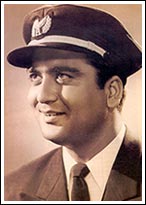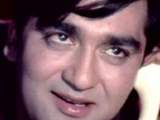May 25th was second death anniversery of Sunil Dutt or Dutt sahib as he is affectionately known...
May 25th was the second death anniversary of actor-turned-politician Sunil Dutt, a multi-faceted personality who was loved by his countrymen for his social services and acting skills as well. He not only entertained audience with his acting, he also worked unceasingly for the uplift of downtrodden besides travelling nooks and corners of the world for global peace.
Sunil Dutt-The Star
Sunil Dutt became a star in the 1950s and appeared in more than 100 films. Starting out in radio, Dutt was very popular announcer on the Hindi Service of Radio Ceylon, the oldest radio station in South Asia. He moved to Hindi film industry and started his career in the tinsel town with the movie 'Railway Platform' in 1955. Sunil shot to stardom with Mehboob Khan's mega hit 'Mother India' in 1957. Renowned actress of her times, Nargis, was his co-star in the film and Sunil saved her life when fire broke out at the sets during the shooting of the film. This made Nargis his fan and they got married in 1958.
Mother India, in which he played the role of Birju, had won an Oscar nomination in the Best Foreign Film category.
Sadhna , Sujata , Main Chup Rahungi , Yeh Raastein Hain Pyar Ke, Mujhe Jeene Do , Yaadein Gumraah , Waqt, Padosan and Humraaz, to name a few, are some of his memorable films.
He was last seen in Vidhu Vinod Chopra's Munnabhai M.B.B.S in 2003 which also starred his son Sanjay Dutt.
Dutt also made films himself. Reshma Aur Shera, Dard Ka Rishta and Yeh Aag Kab Bujhegi are some of the films he made.
Nargis Dutt died of cancer in 1981, the year their son Sanjay made his Bollywood debut with Rocky.
It was after the death of his wife, Nargis Dutt due to cancer that he turned his attention to social work. He started with working for those afflicted by the dreaded disease. He raised funds for the Nargis Dutt Foundation and used them to fund equipment and medication to treat cancer patients. He also helped the cricketer Imran Khan collect funds for his cancer hospital in Pakistan and did the same for one in Kenya.
Dutt-A man for peace
Sunil Dutt was also committed to peace. It was proved by him when in 1987 he walked 2000 km from Bombay to Amritsar, accompanied by his daughter Priya and many others, and prayed at the Golden Temple for peace in Punjab which was reeling under militancy crisis at that time.
A year later, he undertook a padyatra from Nagasaki to Hiroshima in Japan to protest against nuclear weapons. He also travelled through Sri Lanka, India, Bangladesh, Bhutan and Nepal as part of the "Hands Across the Borders" peace expedition.
Way back during 1962 Indo-China war, Dutt made generous monetary donation.
Dutt-The politician
Apart from being a noted actor, Dutt had an inclination towards politics. He joined Congress and won his Mumbai seat five times on the party's ticket. He also worked tirelessly for slum dwellers there.
In 1984 he was elected on a Congress ticket from Mumbai North-west to the 8th Lok Sabha.
Thereafter, except once, he contested from the same constituency and won every time, including the last general election three years back.
Dutt became a Union Minister for the first time in his over two decade of political career when Prime Minister Manmohan Singh gave him the Sports and Youth Affairs portfolio.
He died of cardiac arrest in his sleep on May 25, 2005 at his residence in Mumbai.














comment:
p_commentcount